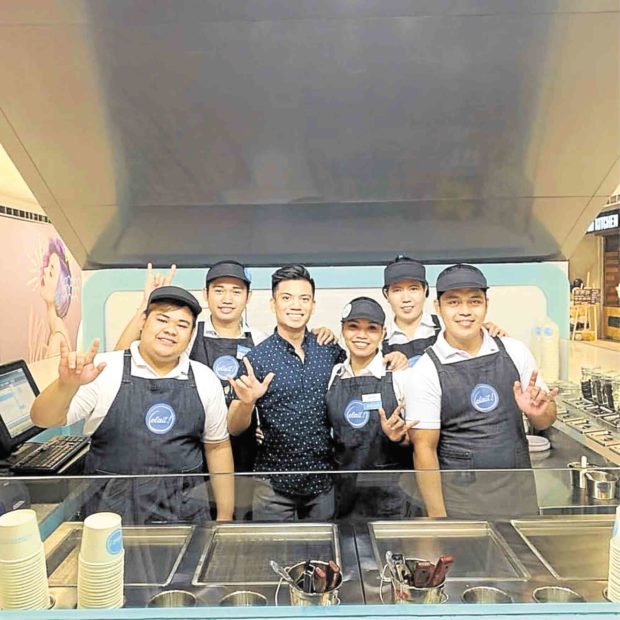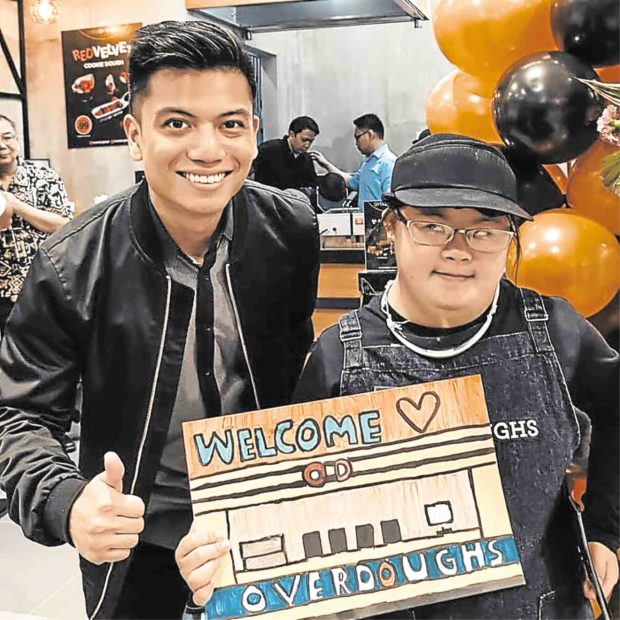Lending an empathetic ear

Francis Carl Reyes, Caravan Food Group Inc. CEO, and Elait! deaf partners make the “I love you” sign. —CONTRIBUTED PHOTO
A teenager, skinny and dressed modestly, walks into a clothing store. He goes around to browse, but quickly notices the unwelcoming stares being thrown his way by the store’s sales staff, as if asking, “Can you even afford anything here?”
The young man starts to feel embarrassed until one salesperson with a different demeanor approaches him. This staff member is warm, and ready to assist his customer the best way he knows how—with a big smile and signs and gestures, because he is, as written on a tag on his chest, deaf.
This is the real-life experience of Francis Carl Reyes, CEO and founder of Caravan Food Group Inc., which pushed him to do what he does today: employ primarily persons with disabilities (PWDs), particularly the deaf, and those with autism and Down Syndrome. Caravan is the company behind mall-based dessert stalls Elait! and Overdoughs, which sell rolled ice cream and cookies and doughnuts, respectively.
“What I experienced then as a teenager [in that clothing store] was the epitome of service. That deaf staff member really tried his best to assist me, he wasn’t discriminatory,” says the 27-year-old entrepreneur. “When I was conceptualizing Caravan, I just remembered that, and I thought, if they could give really good customer service, why don’t I put them in the spotlight?”
The idea to employ deaf professionals actually came before that of Caravan. To find the right people, Reyes says he approached many foundations before finally finding the perfect partner: the College of St. Benilde School of Deaf Education and Applied Studies (SDEAS).
Article continues after this advertisement“It was pretty much blind trust on their part,” Reyes says, chuckling. “I told them what I wanted to do—there was no stall yet—but I told them, trust me, I’m going to do this. And they did.”
Article continues after this advertisementSDEAS initially referred two of their graduates to Reyes; today, he has over 70 deaf partners in his stores.
With Overdoughs, Reyes focuses on hiring part-time employees with autism and Down Syndrome, aside from the full-time deaf partners. Part-timers work only four hours a day, and they get to choose the days when they want to work.
After convincing SDEAS, Reyes had to convince another person of his business idea: his father, Fred, who cofounded skin care company SkinStation with wife Carleen.
“Whenever I had a business idea, I’d go to my father about it and he’d just say, ‘Oh, okay.’ I’d know that even though he says that, I hadn’t really convinced him,” says Reyes, who still helps out with his parents’ business. “So when I finally came up with Elait!, I prepared this whole presentation, and I called the whole family in the office. I mean, they were all there, so why not have a meeting? I presented my idea. Finally, my dad said, if I were a mall, I’d get you.”
With his dad’s approval, Reyes used his savings that he earned by working for a hotel in the United States for a year.
Inclusivity, therefore, isn’t just a company initiative in Caravan—it’s part and parcel of their DNA. And this inclusivity doesn’t just stop at the rank and file level; Reyes says they also craft career paths for their employees so they can take on leadership roles in the company.
In fact, one of Reyes’ two original hires from SDEAS, Kelvin Añonuevo, works as a team leader at the Elait! branch in SM Mall of Asia, one of their busiest stores.
“I’ve seen how capable they are, and I felt that it was a shame that they weren’t being given leadership roles in companies. So from team leaders, we train them to become supervisors, and then from the slate of supervisors, we can choose area managers. We want to create a career path for them, so they can stay in the company, and they really feel their worth,” says Reyes, who laments that during interviews, applicants usually share how they see themselves as a burden to their families because of their condition.
“They say, ‘I just want to feel that I’m worth something’—and that’s something I really heard,” Reyes adds. “Usually, deaf professionals end up in factories, not on the front lines of a food business.”
And Reyes finds that his investment in this differently abled workforce is paying off: Feedback on customer service has been nothing but positive, which validates his experience when he was still that teenager in that clothing store.
“I saw that customers really liked interacting with the deaf, that kids would rush to the stalls to do sign language,” Reyes says. Elait!’s stalls have posters that display instructions on basic sign language, like how to say “thank you,” and “I love you.” They also give out cards that have the complete sign language alphabet. To make things easier for deaf partners, there is an order form that customers fill out to specify what they want.
To further support the deaf community, Reyes initiated The Good Cookie Project under Overdoughs. A portion of the proceeds of their cookie sales funds the education of SDEAS’ scholars.
“This is my version of what entrepreneurship can be—that it can be a solution to many problems,” Reyes says.
